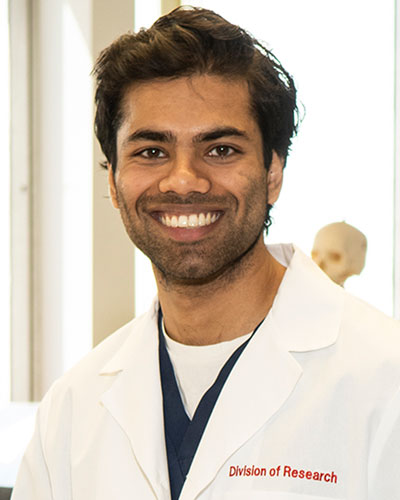Student Research Spotlight
Vishwant Tatagari (DO '21)
April 9, 2019 Vishwant Tatagari’s (DO ’21) journey to medical school started at the University of
Maryland-College Park where he received his bachelor of science in biology. After
completing his master’s degree in biomedical sciences from Philadelphia College of Osteopathic Medicine (PCOM), Mr. Tatagari enrolled in PCOM’s doctor of osteopathic medicine (DO) program. It was in his second year that Mr. Tatagari came across the fabella
bone, a biological variant that occurs in about 30 percent of the population. With
the assistance of fellow students and professors, Mr. Tatagari began his research
on this biological irregularity.
Vishwant Tatagari’s (DO ’21) journey to medical school started at the University of
Maryland-College Park where he received his bachelor of science in biology. After
completing his master’s degree in biomedical sciences from Philadelphia College of Osteopathic Medicine (PCOM), Mr. Tatagari enrolled in PCOM’s doctor of osteopathic medicine (DO) program. It was in his second year that Mr. Tatagari came across the fabella
bone, a biological variant that occurs in about 30 percent of the population. With
the assistance of fellow students and professors, Mr. Tatagari began his research
on this biological irregularity.
What did you study?
I studied the incidence of the fabella bone in a particular human population. The
fabella bone is an additional bone sometimes found in the knee. The fabella can lead
to painful pathologies such as fabella pain syndrome and common fibular nerve palsy.
In researching this bone further, our hope was to gain a better understanding of why
the bone appears and hopefully help combat these common and painful maladies.
What prompted you to pursue research?
I started a work-study job in the cadaver lab at PCOM in the summer of 2016 and found out there were numerous
research projects being conducted by professors and students. I knew that this was
something I wanted to be a part of. The following winter when I was helping to teach
assist a biomed anatomy class, I came across a fabella when reviewing the anatomy
of the knee of a cadaver. When I researched the fabella further, I found there was
very little understanding of the bone to date. I decided I wanted to dive deeper and
selected this as the topic of my current research project.
What experience do you have conducting research?
During my undergrad studies, I was actively involved with the US Department of Fish
and Wildlife. I helped them to research the migratory patterns of specific birds from
Antarctica to the Arctic. This hands-on experience helped me build a foundation of
research techniques which I still use here at PCOM.
For this particular research topic, I worked alongside other PCOM students to dissect
the knees of over 90 cadavers in search of the fabella. In our sample population,
there has been a 33 percent incidence of fabella. This is a slight increase from the
worldwide statistic [of] around 30 percent. What’s most interesting about this research
project is that it is the first of its kind to be conducted in a North American population.
To date, most of the research conducted on the fabella has concentrated on Asian populations,
which have been known to present a higher incidence of the fabella.
What were your responsibilities in your research project?
With the help of fellow students and professors from the Department of Bio-Medical Sciences, we completed the dissections of our sample population and compiled our findings
into a research poster. That poster was presented at the American Osteopathic Academy
of Orthopedics’ annual conference in Atlanta, GA.
Currently, I am working in collaboration with other PCOM students and faculty members
to identify the cellular components of the bone. We are also working to compose a
journal article documenting our findings for publication.
What is the broader impact of your research?
There is a lack of surrounding clinical research of the fabella, specifically in orthopedics.
The fabella has been found to contribute to a number of orthopedic pathologies including
common peroneal nerve palsy and fabella-associated ligament injury. It is our hope
that this project will bring to light a cause of some common orthopedic injuries.
You May Also Like:
About Philadelphia College of Osteopathic Medicine
Established in 1899, Philadelphia College of Osteopathic Medicine (PCOM) has trained
thousands of highly competent, caring physicians, health practitioners and behavioral
scientists who practice a “whole person” approach to care—treating people, not just
symptoms. PCOM, a private, not-for-profit accredited institution of higher education,
operates three campuses (PCOM, PCOM Georgia and PCOM South Georgia) and offers doctoral degrees in clinical psychology, educational psychology, osteopathic
medicine, pharmacy, physical therapy, and school psychology. The college also offers
graduate degrees in applied behavior analysis, applied positive psychology, biomedical
sciences, forensic medicine, medical laboratory science, mental health counseling,
physician assistant studies, and school psychology. PCOM students learn the importance
of health promotion, research, education and service to the community. Through its
community-based Healthcare Centers, PCOM provides care to medically underserved populations.
For more information, visit pcom.edu or call 215-871-6100.
Contact Us
For general media inquiries, please contact the Office of Marketing and Communications
at 215-871-6300 or communications@pcom.edu. Visit our media relations page to view contact information for public relations personnel.
Connect with PCOM

 Vishwant Tatagari’s (DO ’21) journey to medical school started at the University of
Maryland-College Park where he received his bachelor of science in biology. After
completing his master’s degree in
Vishwant Tatagari’s (DO ’21) journey to medical school started at the University of
Maryland-College Park where he received his bachelor of science in biology. After
completing his master’s degree in 